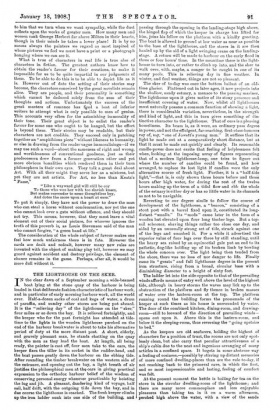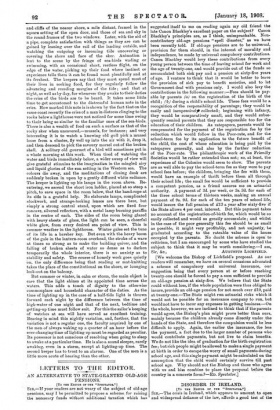• THE LIGHTHOUSE ON THE SKER.
IN the clear dawn of a September morning a wide-beamed boat lying at the stone quay of the harbour is being loaded in that deliberate fashion characteristic of harbour work, and in particular of early morning harbour work, all the world over. Half-a-dozen sacks of coal and kegs of water, a drum of paraffin, and sundry other stores are being put aboard. It is the "relieving day" of the lighthouse on the "sker," four miles or so down the bay. It is relieved fortnightly, and the keeper who for the past fortnight has attended at tide- time to the lights in the wooden lighthouse perched on the end of the harbour breakwater is about to take his alternative period of duty at the more distant post. A short, elderly, and gravely pleasant man, he stands chatting on the quay with the men as they load the boat. At length, all being ready, the painter is cast off, four men take to the oars, the keeper fixes the tiller in its socket in the rudder-head, and the boat passes gently down the harbour on the ebbing tide. After rounding the timber breakwater on the western side of the entrance, and opening out the bay, a light breath of air justifies the philosophical men at the oars in giving practical expression to the orthodox harbour belief of the wisdom of conserving personal energy whenever practicable by hoisting the lug and jib. A pleasant, dandering kind of voyage, half sail, half drift, with the outgoing tide down the bay, and in due course the lighthouse is reached. The fresh keeper climbs up the iron ladder sunk into one side of the building, and
passing through the opening in the landing-stage high above, the hinged flap of which the keeper in charge has lifted for him, joins his fellow on the platform with a kindly greeting. The boat is allowed to ground at low water as near as possible to the base of the lighthouse, and the stores in it are then hauled up by the aid of a light swinging crane on the landing- stage. A return will be made to harbour on the early flood in three or four hours' time. In the meantime there is the light- house to turn into, or rather to climb up into, and the sker to walk over, with, maybe, a conger to be caught in one of its many pools. This is relieving day in fine weather. In winter, and foul weather, things are not so pleasant.
The sker of to-day was once the bottom ballast of an old- time glacier. Flattened out in later ages, it now projects into the shallow, sandy estuary, a menace to the passing mariner. The lighthouse upon it gives notice of its stony presence and insufficient covering of water. Now, whilst all lighthouses must naturally possess a common functien of showing a light, there is considerable variation, nevertheless, la the strength and kind of light, and this in turn gives something of dis- tinctive character to the lighthouse. That of ours is a pleasing homeliness. Its beam is, as it were, an ordinary pass degree in power, and not the effulgent, far-reaching, first-.class-honours ray of, say, "one of Jowett's young men." It suffices that its light be made out at a comparatively short distance, but at that it must be made out quickly and clearly. Its reasonable candle-power does not excite that feeling of helplessness felt when, looking at the imposing array of figures representing that of a modern lighthouse-lamp, one tries to figure' out where the number of candles could be found, and heir arranged, to replace its lost light if candles were the only alternative source of fresh light. Further, it is a "half-tide light,"—that is, is only shown three hours before and three hours after high water, for during the rest of the twelve hours making up the term of a tidal flow and ebb the whole of the estuary is either dry or has so little water in its channels as not to be navigable.
Reverting to our degree simile to follow the course of development of the lighthouse, a "beacon," consisting of a stout post with a barrel fixed upon it, constituted its long. distant "smalls." Its " mods " came later in the form of a wooden but elevated upon four long timber legs. But a top- sail schooner, shaving things rather too close one day, and aided by an unusually strong set of tide, struck against one of the legs and smashed it. For a while it advertised the superior value of four legs over three by still standing, until the heavy sea raised by an equinoctial gale put an end to its pathetic, dog-like holding up of its broken limb by bowling the whole concern over. The light being then tended from the shore, there was no loss of nor danger to life. Finally came its "greats" and full lighthouse degree in the present iron structure, rising from a broad, circular base with a diminishing diameter to a height of sixty feet.
The ladder let into the side opposite to that of the prevailing winds affords means of entry well above the level of the highest tide, although in heavy storms the waves may lick up to the obstruction of the platform and fly thence in broken masses of water over the lantern-room at the top. The platform running round the building forms the promenade of the keeper at such times as his house is surrounded by water. The door of the combined kitchen, dining-room, and drawing- room—still to leeward of the direction of prevailing winds— opens out upon it. Above this is the lantern-room, and below it the sleeping-room, thus reversing the "going upstairs to bed."
As the keepers are old seafarers, holding the highest of characters for a position of trust, the rooms are not only spot- lessly clean, but also carry that peculiar attractiveness of a ship's cabin due to the neat and ingenious arranging of many articles in a confined space. It begets in some abstruse way a feeling of cosiness,—possibly by stirring up distant memories of more confined dwelling-places than are the rule to-day, if not reaching back to the primeval cave, in which the first, and so most impressionable and lasting, feeling of comfort was felt.
At the present moment the kettle is boiling for tea on the stove in the circular dwelling-room of the lighthouse; and there are many more commonplace and less enjoyable pleasures than taking tea in it on a warm afternoon, perched high above the water, with a view of the sands and cliffs of the nearer shore, a mile distant, framed in the square setting of the open door, and those of sea and sky in the round frames of the two windows. Later, with the aid of a pipe, complete satisfaction with things as they are can be gained by leaning over the rail of the landing outside, and watching the outgoing or incoming tide uncovering or covering the shore and face of the sker. Animation is lent to the scene by the fringe of sea-birds wading or swimming, with an occasional short, restless flight, on the edge of the water, picking up their food where instinct or experience tells them it can be found most plentifully and at its freshest. The keepers say that they must spend most of their lives in seeking food, for they regularly follow the advancing and receding margins of the tide ; and that at night, as well as by day, for whenever they awake to their duties the cries of the birds are to be heard. It takes some little time to get accustomed to the distressful human note in the cries. How marked this note is is shown by the fact that on the same coast recently the cries of a man in distress clinging to the rocks below a lighthouse were not noticed for some time owing to their being so similar to the familiar ones of the sea-birds. There is also a wealth of food on such a surface as that of the rocky sker when uncovered,—mussels, for instance; and very interesting it is to watch a knowing old gull pick a mussel loose from a cluster, fly well up into the air with it, drop it, and then descend to pick the savoury morsel out of the broken shell. A solitary old gourmet of a bird will sometimes put in a whole morning at this ,work. When tired of watching the water and birds immediately below, a wider sweep of view will give grateful stimulus to the imagination in the mingled airy and liquid glories of the sun setting in the Western sea. The colours die away, and the meditations of closing dusk are suddenly broken in upon by a gently diffused white radiance. The keeper is lighting up his lamps in the room above. Re- entering, we ascend the short iron ladder, placed at so steep a pitch, to save space in the room below, that the hand-rope at its side is a grateful help. No elaborate lamps, complicated .clockwork, and strange-looking lenses are there here, but simply a strong central stand, upon which are fixed four concave, silvered reflectors, with a metal lamp burning paraffin in the centre of each. The sides of the room being glazed with heavy sheets of glass, the light can be seen, a cheerful white glow, from every desired sea point of view. This is summer weather in the lighthouse. Winter gales set the tune of its life in a harsher key. But even with the heavy boom of the gale in the lantern-room overhead, the stroke of a wave at times so strong as to make the building quiver, and the falling of broken sheets of water so dense as to darken temporarily the whole interior, there is no anxiety as to stability and safety. The course of homely work goes quietly On, the only difference being that reading or mat-knitting takes the place of the constitutional on the shore, or lounging look-out on the balcony.
But summer or winter, in calm or storm, the main object is care that the light shines at its appointed time across the ,waters. This adds a touch of dignity to the otherwise commonplace and household character of the duties. As the time of lighting up in the case of a half-tide light is thrown forward each night by the difference between the time of high-water of one night and that of the next, bedtime and getting-up time must follow suit. For this the sailor's keeping of watches at sea will have served as excellent training. Bearing in mind this nightly variation, and, further, that the variation is not a regular one, the faculty acquired by one of the men of always waking up a quarter of an hour before the ever-changing time of lighting up must be regarded as peculiar. Its possessor is not conscious of resolving when going to sleep to awake at a particular time. He is also a sound sleeper, rarely awaking, even in a storm, except at lighting-up time. The second keeper has to trust to an alarum. One of the men is a little more acute of hearing than the other.







































 Previous page
Previous page